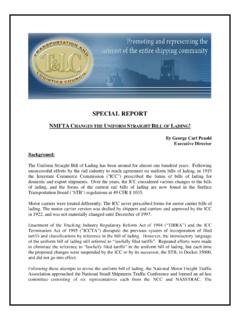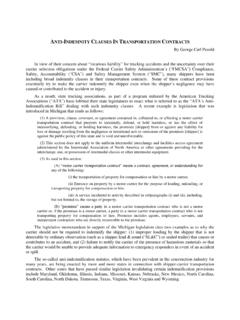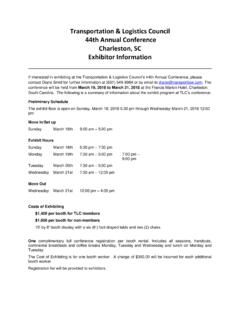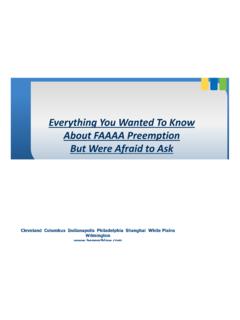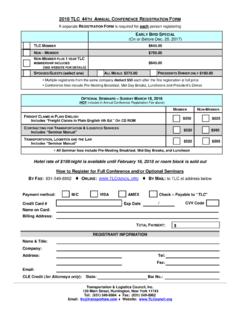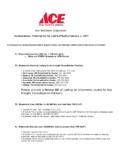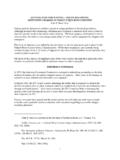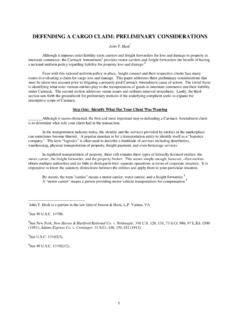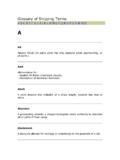Transcription of The (Damage) Freight Stops Here. (But Now What …
1 Presented by: Eric L. Zalud and Martha Payne Benesch Friedlander Coplan & Aronoff LLP The (Damaged) Freight Stops here . ( but now What Do We Do With It?) The Pitfalls of Salvage and Damage Mitigation March 23 - 25, 2015 Transportation & Logistics Council, Inc. 41st Annual Conference Orlando, Florida 2 Defense often asserted in lawsuit for Freight damage is that shipper or consignee has not appropriately mitigated its damages by salvaging and reselling damaged Freight . Also, shipments may be refused by consignee on grounds of delay, or other bases. In those situations, obligations arise for carrier to take action to salvage and resell goods. INTRODUCTION: Damage Mitigation Obligations 3 Perishable goods: Extremely problematic if arriving damaged upon delivery. FDA statutes, and commensurate regulations, that prohibit sale of adulterated food. See generally, 21 342. Applicable FDA standards may make it illegal or improper to sell damaged products which are intended for human use or consumption.
2 Restrictions should be taken into consideration in determining damages sustained to contaminated cargo. PERISHABLE GOODS: ACT FAST, BUT BE CAREFUL! 4 As Gerber Products Co. v. Fisher Tank Co., 833 505 (4th Cir. 1987), explained: At the very least, Gerber reasonably believed that the law forbade its marketing [of] its contaminated product. The defendants in this case have no standing to insist that Gerber should have undertaken to minimize its loss by the risky course of undertaking to market its contaminated foods when there was abundant reason to believe that such marketing activity would be unlawful. See also, Blasser Brothers v. Northern PanAmerican Line, 628 376 (5th Cir. 1980). PERISHABLE GOODS: ACT FAST, BUT BE CAREFUL (cont.) 5 Federal Food, Drug and Cosmetic Act provides, in pertinent part, that: A food shall be deemed to be adulterated.. if it has been prepared, packed or held under unsanitary conditions whereby it may have been contaminated in filth, or whereby it may have been rendered injurious to health.
3 Section 402, 21 342(a)(4) Statute also contemplates storage in unsanitary conditions Also governs food products that may have become contaminated; Frequent litigation point. PERISHABLE GOODS: ACT FAST, BUT BE CAREFUL (cont.) 6 Amstar Corp. v. Transport Service Co., 7 111. Dec. 104, 48 111. App. 3d 1031, 364 2d 91 (1977) Liquid sugar had been contaminated with vegetable oil; Was delivered by carrier into connecting tanks of consignee. Pre-existing liquid sugar became contaminated and plant had to close down for cleaning. Carrier was found liable for damage to the sugar, and also for clean up. Intermingling Contaminated Shipment with Unadulterated Prior Load May Result in Consequential Damages 7 The Pillsbury Co. v. Illinois Central Gulf Railroad Corp., Civ. No. 479289 (D. Minn. October 15, 1981), aff'd, 687 241 (8th Cir. 1982): Upon arrival at destination, railroad cars had beetles in cars and on top of bags of Pillsbury flour.
4 Bags had been held in railroad's yard for two days. Evidence indicated that cleaning of yard was infrequent. Court found that flour was commercially worthless. Mere Possibility of Contamination May Preclude Any Salvage 8 Railroad had argued that although there were beetles in car at destination, there was no damage to flour itself. Court rejected that argument on grounds that, as per statute, if unsanitary conditions may have subjected food to contamination, it is considered adulterated. Consequently, Pillsbury recovered full value of potentially infested flour. Railroad was also liable for fumigation costs. The Pillsbury Co. v. Illinois Central Gulf Railroad Corp., Civ. No. 479289 (D. Minn. October 15, 1981), aff'd, 687 241 (8th Cir. 1982) 9 Seabound Allied Milling Corp. v. Consolidated Rail Corp., Civil Action No. 798828 (July 22, 1980) Mere breaking of railroad car seals, so that integrity of load of flour was in doubt, was sufficient to find damage to flour products themselves.
5 Consignees and carriers should be extremely careful with perishable food products in salvage situations. Careless efforts to salvage food products may themselves result in contamination of products under the Act. Thus may increase claimant's damages. Mere Possibility of Contamination May Preclude Any Salvage 10 When in doubt, courts, for public policy reasons, will err toward not permitting potentially contaminated food out into the stream of commerce. As Swift-Eckrich, Inc. v. Advantage Systems, Inc., 55 F. Supp. 2d 1280 (D. Kan. 1999), summarized: Because Swift-Eckrich's determination that it was singularly unwise to sell the meat for human consumption stands insufficiently controverted, no genuine issues of fact preclude the court from granting summary judgment on the issue of damages. Swift-Eckrich could not in good conscience sell the warm meat for human consumption. Because the defendants present no other possibility for the sale of the meat, no reasonable factfinder could conclude that Swift-Eckrich could have taken any other reasonable steps under the circumstances of this case to mitigate its damages.
6 Courts Err Toward Not Salvaging Unsafe Food Products 11 Damaged goods that may create health hazards if used, such as medications; Goods that require license to resell, such as alcohol or tobacco products; Specific Goods That Cause Salvage Difficulties 12 If manufacturer's trademark is affixed to product or to its packaging and is not removable, manufacturer may allege that entry of damaged product into stream of commerce could damage its reputation and commercial goodwill. See Perugina Chocolates & Confections, Inc. v. S/S Ro Ro Genova, 649 F. Supp. 1235, 1240 ( 1986); Sony Magnetic Products, Inc., of America v. Merivienti O/Y, 863 1537 (11th Cir. 1989). Trademarked Goods 13 See also, Eastman Kodak Co. v. Westway Motor Freight , 758 F. Supp. 641 (D. Colo. 1991), aff'd 949 317 (10th Cir. 1991) As a matter of law, however, I conclude it is unreasonable to force Kodak to sell products the parties agree are commercially.
7 To surmount these trademark considerations, carrier must show that goods could be sold without being traceable to shipper. Without such proof, salvage value of damaged goods is limited to their value, if any, in recycled form. Trademarked Goods (cont.) 14 However, courts are mindful that this exception could swallow rule. Thus, not an automatic defense to attempt to salvage trademarked goods. As To k i o Marine & Fire Ins. Co. v. Norfolk & W. Ry. Co., Civ. Action No. 6:94CV 535 ( Sept. 6, 1996) explained: Despite these cases, there is not a rule that a respectable manufacturer does not have to risk harm to its reputation by selling damaged goods. Such a gloss on the mitigation rule would threaten to swallow the rule itself. It is the nature of the mitigation doctrine to force shippers to sell damaged goods. Thus, in almost any circumstance, a shipper can claim that it would suffer a blow to its reputation if it had to release second quality goods on the market.
8 Such a rule would be both wasteful and unfair to carriers because marketable and valuable goods could he destroyed just because of a small chance of minor harm to the shipper's reputation. Trademarked Goods (cont.) 15 Tokio Marine case involved damaged Honda automobiles. Court found that minor repairs would permit resale of some of cars without damage to Honda's trademark. These cases often turn upon severity of damage, in conjunction with quantum of consumer identification with product's brand name. No hard and fast rule. Trademarked Goods (cont.) 16 Another reason to support failure to mitigate damages by reselling damaged Freight , is the risk of product liability suit if product is resold. See, Gerber Prods Co. v. Fisher Tank Co., 833 505 (4th Cir. 1987). Product Liability Concerns 17 Consignee who receives damaged goods should conduct careful survey of entire load, so that undamaged goods will not be sold as salvage, with damaged merchandise.
9 Shipper/Consignee duty to Mitigate Damages: Taking an Adequate Survey 18 See Dixie Plywood Co. v. S. S. Federal Lakes, 404 F. Supp. 461. (D. Ga. 1975). Failure to segregate damaged from undamaged goods caused delay in salvage sale. Thus, there was failure to mitigate damages. Consequently, salvage sale price was not considered in damage formula. Shipper/Consignee duty to Mitigate Damages: Taking an Adequate Survey 19 In these situations, defendant, who will generally be carrier, has burden to prove that plaintiff shipper/ consignee did not exercise reasonable diligence in mitigating its damages. The shipper or consignee need only take: reasonable steps under the circumstances of the particular case to mitigate its damages. Eastman Kodak Co. v. Westway Motor Freight , Inc., 949 F 2d. 317, 320 (10th Cit. 1991). Shipper/Consignee duty to Mitigate Damages: Carrier Has Burden of Proof on Mitigation 20 Consignee must accept damaged goods when delivered unless they are totally worthless.
10 See FrasierSmith Co. v. Chicaa Rock Island and Pacific R. Co., 435 1396, 1399. Totally worthless has been defined to mean that damaged goods were worthless for their intended purpose, and that there is no secondary market in which damaged goods could be sold. Oak Hall Cap and Gown Co. v. Old Dominion Freight Line, Inc., 899 291, 294 (4th Cir. 1990). Consignee has general duty to accept goods because consignee is generally in better position to dispose of damaged goods than carrier. Particularly when consignee is in business of trading in type of merchandise involved. See Pilgrim Distrib. Corp. v. Terminal Transp. Co., 383 F. Supp. 204 ( Ohio 1974). Consignee s Duty to Accept the Goods 21 Tender of delivery of cargo by carrier to consignee, and consignee's refusal to accept goods, generally terminates carriage, and terminates carrier's responsibility as a carrier. However, carrier then holds goods as a bailee or warehouseman.
